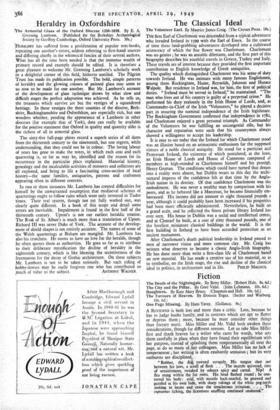The Volunteer Earl. By Maurice James Craig. (The Cresset Press.
18s.) THE first Earl of Charlemont was descended from a typical adventurer who invaded Ireland in-1599 with the Earl of Essex. In the course of time these land-grabbing adventurers developed into a cultivated aristocracy of which the fine flower was Charlemont. Charlemont was no genius ; he was an amiable dilettante, and the first part of this biography describes his youthful travels in Greece, Turkey and Italy. These travels are of interest because they provided the first important contribution to English knowledge of Greek antiquities.
The quality which distinguished Charlemont was his sense of duty towards Ireland. He was intimate with many famous Englishmen, among them Rockingham, Hume, Reynolds, Johnson and Horace Walpole. But residence in Ireland was, for him, the first of political duties. " Ireland must be served in Ireland," he maintained. "The man who lives out of his country is guilty of a perpetual crime." He performed his duty zealously in the Irish House of Lords, and, as Commander-in-Chief of the Irish "Volunteers," he played a decisive part in assuring the nominal independence of the Irish legislature. The Rockingham Government confirmed that independence in 1782, and Charlemont enjoyed a great personal triumph. As Commander of the Volunteers he was fulfilling an uncongenial role, but his character and reputation were such that his countrymen always showed a willingness to accept his leadership.
It is easy to see today that the Ireland for which Charlemont stood was an illusion based on an aristocratic enthusiasm for the supposed virtues of a noble classical antiquity. He stood for a patrician and Protestant Ireland, the existence of which postulated, at the least, an Irish House of Lords and House of Commons composed of members as high-minded as Charlemont himself and his proteg6, Henry Grattan. The conditions which could have turned that dream into a reality were absent, but Dublin wears to this day the archi- tectural impress of the confidence felt at that time by the Anglo- Irish nation in its destiny. Of that confidence Charlemont was the embodiment. He was never a wealthy man by comparison with his peers, and as he behaved like a Maecenas, he became financially em- barrassed. His income did not amount to eight thousand pounds a year, although it could probably have been increased if his properties had been more, efficiently administered. Nevertheless, he built on a grand scale, and he collected the finest private library Ireland has ever seen. His house in Dublin was a social and intellectual centre, and at Clontarf he built, at a cost of sixty thousand pounds, one of the loveliest miniature classical btfildings in the world. It is the first building in Ireland to have been accorded protection as an ancient monument.
After Charlemont's death political leadership in Ireland passed to men of narrower vision and more common clay. Mr. Craig has written what deserves to become a classic Anglo-Irish biography. He has done more than write a first-class life of Charlemont based on new material. He has made a creative use of his material, so as to symbolise, on the Irish stage, the rise and decline of the classical
ideal in politics, in architecture and in life. PHILIP MAGNUS.


































 Previous page
Previous page